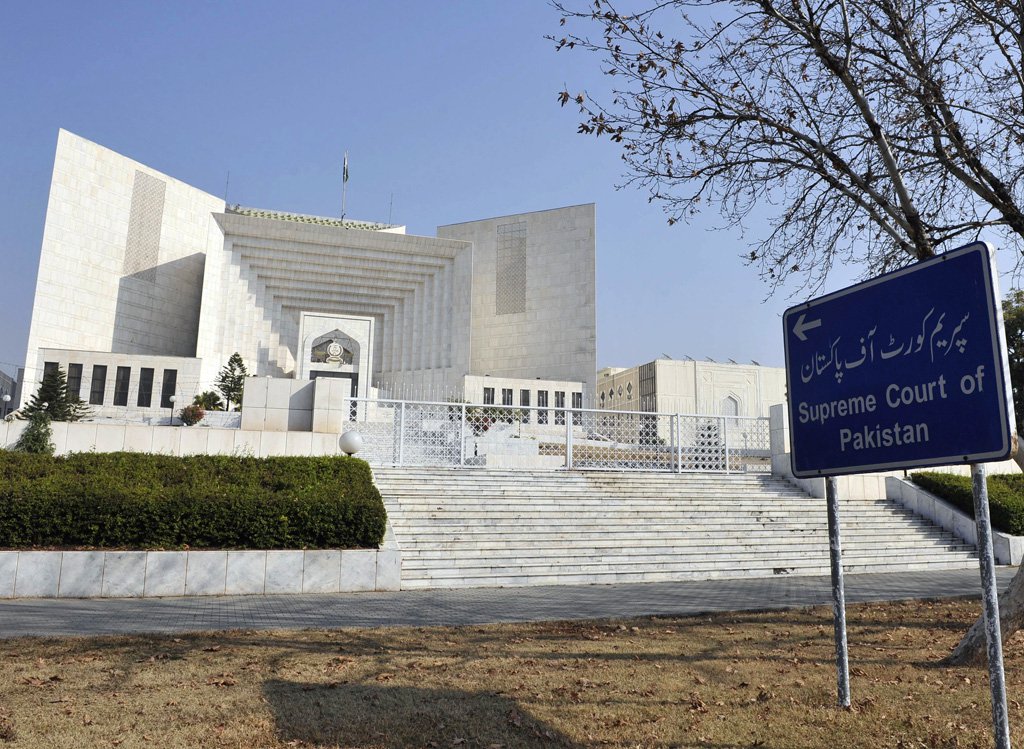
The country’s top judge on Thursday observed that discarding a lawmaker’s vote during no-confidence proceedings was “insulting”. He added that a member of the National Assembly could not be barred from voting.
A larger bench of the Supreme Court, led by Chief Justice of Pakistan Umar Ata Bandial and comprising Justice Ijazul Ahsan, Justice Mazhar Alam Miankhel, Justice Munib Akhtar and Justice Jamal Khan Mandokhail, was hearing a presidential reference which sought an interpretation of Article 63-A of the Constitution, which dealt with the penalty for parliamentarians over defection.
The courtroom was fully packed with lawyers and political leaders. Unlike the last hearing, the top political leadership did not attend the hearing.
However, many federal ministers, especially Foreign Minister Shah Mahmood Qureshi and Planning and Development Minister Asad Umar were present.
Interestingly, a diversion was witnessed in the judges’ observations. Two members of the bench believed that an MNA had the right to vote in a no-confidence motion.
However, two judges were agreeing with Attorney General for Pakistan (AGP) Khalid Jawed Khan’s contentions against horse-trading or floor-crossing.
Senior lawyers believe that Justice Mandokhail’s observations surprised many legal experts, who were considering that the bench’s opinion would be unanimous in the case.
A senior leader of an opposition party said they were closely observing the court proceedings.
He added that there was a chance that disgruntled MNAs would be asked not to vote on the no-confidence motion and they might resign.
He said the government’s allies were likely to announce their decision about whether or not they would support the no-trust motion on Friday (today).
The government functionaries are approaching the “powerful circles” to help them gain the support of the allies.
Political analysts say that the delay in the decision on the presidential reference would further strengthen the bargaining position of the allies.
They say that the top court should avoid giving an opinion, which has political implications. There is no appeal against an opinion given under Article 186 of Constitution.
During the hearing, the CJP noted that the apex court, under advisory jurisdiction, could not fill blanks as could be done through parliament. He added that the mechanism was available in Article 63-A, and the Election Commission of Pakistan’s (ECP) decision could be challenged in the Supreme Court.
Justice Mandokhail referred to Articles 55 and 95 which were vital for an MNA's right to vote.
Justice Miankhel asked the AGP whether or not he wanted to make the party head like a king.
Justice Mandokhail recalled that a Balochistan Assembly member, who had voted in a no-confidence motion, was de-seated and now he was again a lawmaker.
To this, the AGP replied that Article 63-A was not interpreted and therefore he was re-elected.
Another member of the bench, Justice Ijaz ul Ahsan asked the AGP about the scope of the ECP’s inquiry under Article 63 of the Constitution.
Justice Ahsan noted that the ECP would examine the procedural lapses during the inquiry, adding that the Constitution did not justify defection under Article 63-A.
Read Uncertainty abounds around allies' line on no-trust
The CJP also asked the AGP that the government should not link with the court's opinion in the case.
Justice Munib Akhtar, also a member of the bench, observed that political parties were institutions “weakened by disciplinary violations”.
The judge added that the democratic system was weakened if a political party was not strong.
When the AGP read out the Benazir Bhutto case judgment, wherein certain observations were given against floor-crossing, the CJP noted that the verdict was an issue and Article 63-A was inserted through the 18th Amendment in 2010.
The AGP in his written synopsis submitted that Article 63-A(4) provided that on confirmation of declaration of defection by the ECP, the member shall cease to be a member of the House.
“This Article nowhere provides that after ceasing to be a member he can contest elections afresh on seat becoming vacant after his disqualification,” it further read.
The AGP argued in his synopsis that if the intention was to merely de-seat the member from his existing seat and not bar him from contesting afresh, Article 63-A could have easily provided for it.
He added that the original Section 8(2) of the Political Parties Act, 1962 provided that he could contest again and be re-elected in a by-election caused by his own disqualification by way of withdrawal. However, Article 63-A did not provide for it.
“The very fact that the declaration of defection by the party head under Article 63-A was not automatically implemented and became effective only after elaborate procedure as provided in Article 63-A for defection including confirmation by the ECP and appeal to the Supreme Court is a clear indication that de-seating is not merely from the present seat but entails prolonged disqualification.”
Read more Rangers, FC to ‘protect’ Parliament House on no-trust day
The AGP also argued that if merely de-seating was intended, the party head declaration would have been sufficient.
He added that the de-seating emanating from defection under Article 63-A could not be seen in isolation completely divorced from Articles 62(1)(f).
“This is particularly so when a member, having admittedly engaged in constitutionally prohibited and morally reprehensible conduct is presenting himself for re-election to the House. This raises larger issues about the purity of democratic process, infusion of some ethical and moral values in our political system which has been infested with blatant breach of trust of the people. Horse-trading is but one manifestation of this phenomenon.”
The AGP further pointed out that the interpretation that defection merely resulted in de-seating from present membership with right to seek reelection put a “premium on horse-trading” and had promoted this “ignoble trade”.
“Defection entailing lifelong disqualification would not only discourage this cancer but restore the confidence of people in democratic process which is apparently at its lowest point.”
The AGP argued that if a judge or a civil servant with a long career was forever barred from entering office if found guilty of even the slightest misconduct, but a public representative, who was a trustee of the people, was allowed a premium for his misconduct.
He added that such a lawmaker betrayed the trust of the voters as well his party by selling his conscience and changes loyalties for money or other material gains yet he could come back immediately.
The synopsis read that people who were found guilty of offences or crimes far lower in their gravity are barred for life or five years etc., yet this betrayal of trust was to be so richly rewarded by bringing him back to the House to engage in same misconduct all over again.
“To destabilise the government, all that may be required is pockets deep enough, local or foreign, to buy out loyalties of a dozen or so MNAs to join the opposition [on] the day to topple the government, as is being presently witnessed. This will completely shake the confidence of people in parliamentary democracy itself. We must not divorce the standards of probity and character from public discourse and must insist that our public representatives meet the highest moral and ethical standards stipulated in Articles 62 and 63 of the Constitution, as duly interpreted by this Hon’ble Court in recent times. This interpretation has ousted many dubious characters from parliament in recent years.”
The AGP further stated in his synopsis that a conscientious member, who did not defect and preferred to resign from his seat in the assembly due to a disagreement with the party, would immediately cease to be a member of the House, as the process stipulated in Article 63-A did not apply in such a case.
"A defector who votes for money or other illegal consideration in defiance of party directive shall continue to be member long after actual defection until the decision of the Supreme Court in appeal. In both cases the members ‘cease’ to hold their seat and can come back after re-election. There must be qualitative difference in their ceasing to be members. The innocent and conscientious member should not visited with far greater adversity while the one engaging in morally reprehensible conduct should not be better off. He no longer qualifies for and belongs to the national representative institution.”
The AGP further stated that if disgruntled lawmakers wanted to make decisions in accordance with their consciousness, then they should resign.
The hearing of the case is adjourned until Friday (today). The court will take up the case after Friday prayers.


















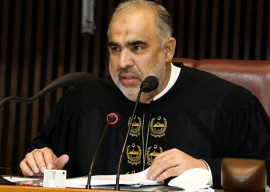
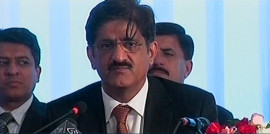
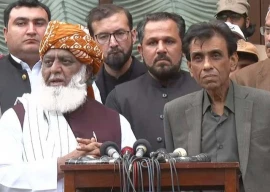
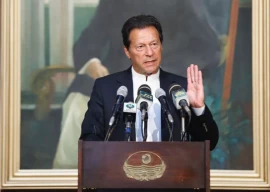
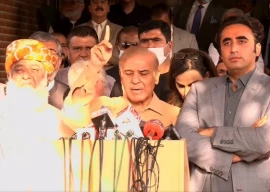
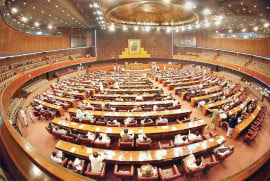


1714478350-0/ojwilson-(4)1714478350-0-270x192.webp)














-(1)1714378140-0/AliAminMaryam-(4)-(1)1714378140-0-270x192.webp)
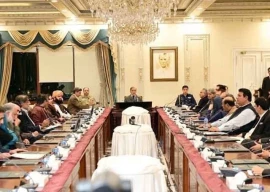
1714370039-0/ojwilson-(1)1714370039-0-270x192.webp)







COMMENTS
Comments are moderated and generally will be posted if they are on-topic and not abusive.
For more information, please see our Comments FAQ